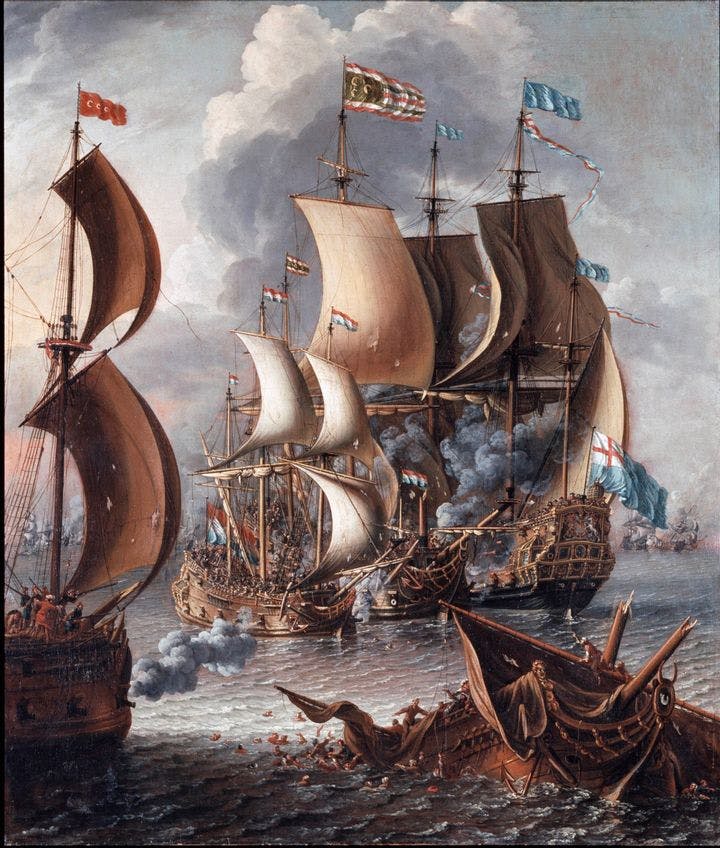Spring 2008
The Barbary Precedent
– The Wilson Quarterly
The war on terror isn't America's first battle against an amorphous Muslim "quasi-state." Early in the country's history, it tried to quell the Barbary pirates. It eventually succeeded, but it wasn't easy.
The war on terror isn’t America’s first battle against an amorphous Muslim “quasi-state.” In its first years of existence, the fledgling United States waged war against the Barbary pirate regencies. Buccaneering was their business, and the corsairs energetically targeted American merchant ships peacefully ferrying pickled fish and wheat across the Mediterranean.
Today, the United States is hardly the feeble upstart it was around the turn of the 19th century, and the Barbary pirates look like puffed-up weaklings in comparison with Osama bin Laden. But the attempt to halt piracy illustrates the extraordinary level of effort required to deter quasi-states from attack when “prestige or religious obligation” is at stake, writes Patrick J. Garrity, a researcher at the University of Virginia’s Miller Center of Public Affairs.
Before 1776 the American colonies’ British overlords provided at least one tangible benefit—England bought protection from Algiers, Tunis, Morocco, and Tripoli against piracy. After independence the British protective shield vanished, and it wasn't long before the four Barbary quasi-states were threatening U.S. ships and seamen. The corsairs not only brought home booty and captives who could be held for ransom, but also carried out the important religious mission of fighting the infidels.
In 1794, the government of President George Washington offered as much as $800,000 to the Barbary regents in ransom and protection money. Not incidentally, the United States also decided to build a navy. Diplomacy brought the emperor of Morocco to a settlement on easy terms. But the Dey of Algiers demanded $2.5 million—more than the entire federal budget. Tunis then sought a similar settlement, and Tripoli demanded cash, presents, a naval vessel, and supplies. The Americans eventually paid something to all three, but gave Algiers pride of place and demanded that the Dey keep the other regencies in line.
But the Unites States fell behind on its payments. When the frigate George Washington sailed into the harbor of Algiers in 1800 with overdue tribute, its commander, anchored under the city’s batteries, was forced to hoist the Algerian flag and take a $40,000 side trip to Constantinople to carry out some business of the Dey’s. Meanwhile, Yusuf, the Pasha of Tripoli, having murdered one brother and ousted another in a coup, declared war on the United States. After struggles as confusing as those in modern Fallujah, the Americans eventually blockaded the harbor of Tripoli.
In 1803 the American frigate Philadelphia ran aground in the Tripoli harbor while trying to chase down a blockade runner, and the corsairs captured 300 men and threw them into prison. Yusuf demanded $3 million in ransom.
Amid the tumult, William Eaton, the newly named Navy agent to the Barbary regencies, hit on a new strategy: regime change. Eaton met Hamet, Yusuf’s deposed brother, in Egypt, and, with a few Marines and several hundred mercenaries, marched across the desert toward Tripoli. Faced with threats of mutiny and desertion (some from Hamet himself) and shortages of food and water, the force captured the coastal city of Derne in April 1805 and asked for help in negotiating the last stretch to Tripoli. Eaton intended to install Hamet on the throne and inflict a “death blow to the Barbary system.” Any claim of mission accomplished, however, was premature.
The American consul general in Algiers, Tobias Lear, perhaps anticipating the “you break it, you own it” doctrine of Colin Powell, put his foot down. If the Marines installed Hamet as pasha in Tripoli, Lear argued, they would be saddled with propping up an unpopular and incapable ruler.
Instead, to secure peace, Lear agreed to pay a ransom of $60,000 for the Philadelphia’s crew and make a “gift” of about $6,000 to Yusuf.
In the end, despite their extraordinary march (which is celebrated in the Marine Hymn), Hamet, along with Eaton and his Marines, were evacuated from Derne, leaving Hamet’s allies in the lurch. Despite four years of war, 10 years of diplomatic negotiations, and millions of dollars in protection money, the Barbary pirates lived to rob again. A second war would be fought before Commander Stephen Decatur shelled Algiers into submission and quelled the Barbary threat—in 1816.
* * *
The Source: “The United States and Barbary Piracy, 1783-1805” by Patrick J. Garrity, in Comparative Strategy, Volume 26, No. 5, 2007.
Image courtesy of Wikimedia Commons
